Overview
The article titled "10 Essential Autism Education Programs for Parents in 2025" highlights the vital autism education programs that will support parents in the coming year. It underscores the significance of tailored interventions and community support, addressing the evolving educational landscape that seeks to empower parents. This approach aims to enhance the developmental outcomes for children with autism, as illustrated by various statistics and research findings presented throughout the content. By focusing on these key areas, the article invites parents to explore resources that can make a meaningful difference in their children's lives.
Introduction
The landscape of autism education is evolving at a remarkable pace, reflecting a growing recognition of the unique needs and strengths of individuals on the spectrum. As parents navigate the complexities of supporting their children, understanding the most effective programs available in 2025 becomes essential.
What strategies and resources can empower families to foster growth and development in their children with autism while also building a supportive community?
This article invites you to explore ten essential autism education programs that promise to enhance educational experiences and outcomes for families in the coming years.
About ASD Media: Comprehensive Resources for Autism Education
At ASD Media, we are deeply committed to enhancing the application of ABA therapy and developing autism education programs, providing a range of resources specifically designed for parents and professionals in the education field who support individuals with developmental disorders. Our comprehensive approach encompasses newsletters, articles, and community forums that empower families to navigate the complexities of special education effectively. Research shows that early interventions are crucial for unlocking potential and improving long-term outcomes; studies reveal that early acceptance of a neurodevelopmental diagnosis correlates with a remarkable 63% improvement in results.
Moreover, 83% of parents share that having a child with developmental differences has expanded their perspective, highlighting the transformative power of community support. By fostering a nurturing atmosphere, ASD Media ensures that individuals can share their experiences and access vital information to enhance outcomes for youth with ADHD. Community forums have been shown to boost caregiver well-being by 67%, underscoring the essential role of shared knowledge and support in promoting positive educational experiences.
As Kerry Magro wisely states, 'Autism is not a tragedy. Ignorance is a tragedy.' With a focus on the latest developments in ABA therapy resources, including the effectiveness of visual aids and the important role of Registered Behavior Technicians (RBTs), ASD Media stands at the forefront of autism education programs related to developmental disorders. We are dedicated to equipping parents and professionals with the necessary tools to unlock the potential of every individual, inviting you to join our community and share your journey with us.
Iowa Education: Definition and Services for Autism Support
In Iowa, autism education programs reflect a heartfelt commitment to inclusivity and personalized support for individuals with Autism Spectrum Disorder (ASD). The Iowa Department of Education has thoughtfully established a variety of autism education programs that are tailored to meet the unique needs of these students, including specialized classrooms and individualized education plans (IEPs). These services ensure that young individuals have access to trained experts who can nurture their academic and social growth within a supportive learning environment.
Recent advancements, including autism education programs like the Autism Support Program initiated in 2013 through legislation passed by the Iowa Senate (Senate File 446), have significantly improved access to Applied Behavior Analysis (ABA) services. This means that young individuals are receiving the essential support they need to flourish. Statistics indicate that those enrolled in full-time autism education programs often show remarkable improvement within 12 to 18 months, underscoring the effectiveness of these programs.
The Iowa Department of Education remains a steadfast advocate for the rights of youth with developmental disorders, ensuring they receive autism education programs and a Free Appropriate Public Education (FAPE) under the Individuals with Disabilities Education Act (IDEA). This comprehensive approach not only fosters academic success but also encourages the development of social skills, which are critical components of autism education programs that prepare children for successful integration into society.
As parents, it’s essential to stay informed and engaged with these resources. Have you explored the options available for your child? Sharing experiences and insights can help build a supportive community for families navigating these challenges together.
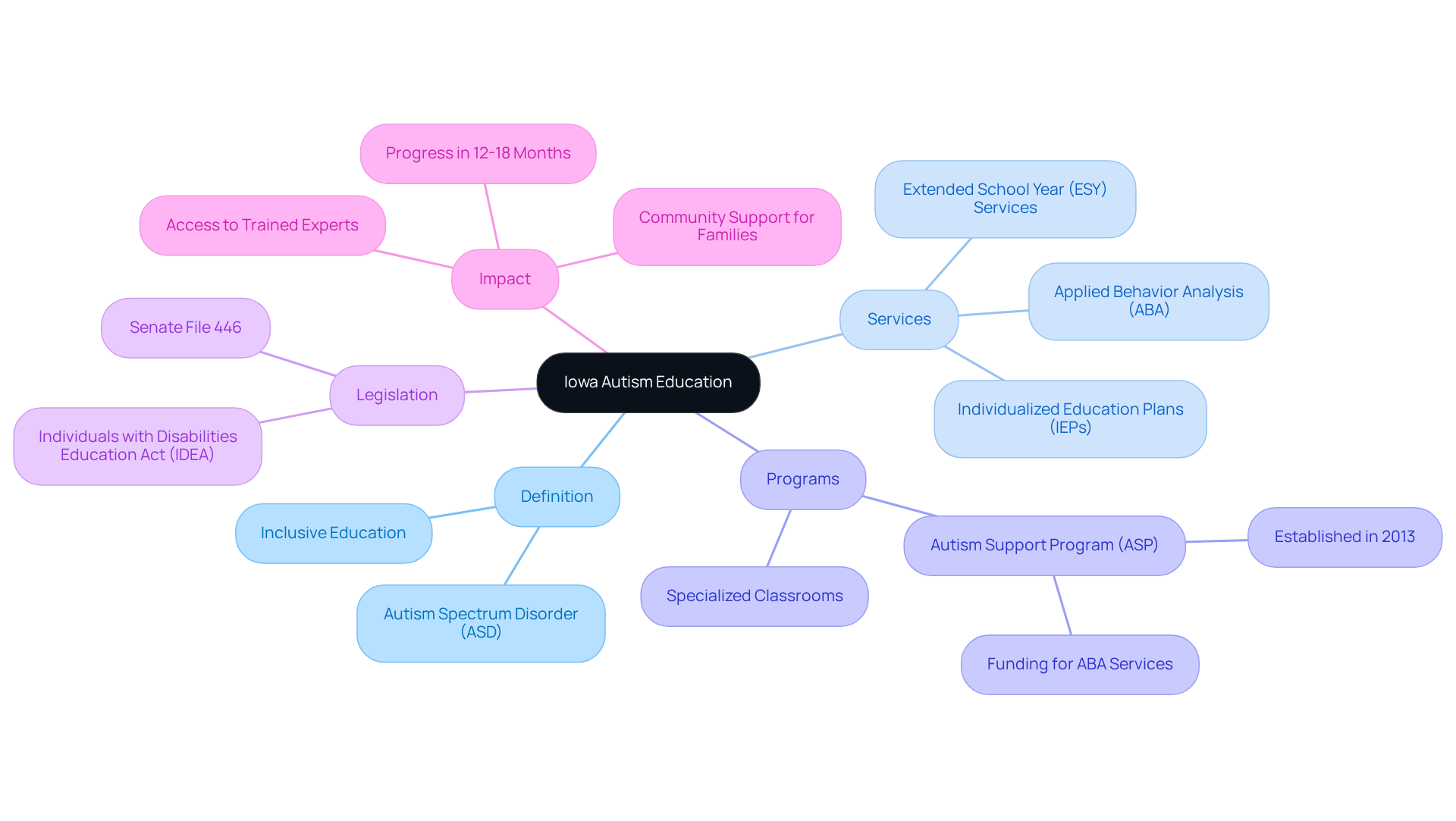
HHH School District: Specialized Autism Program Overview
The Half Hollow Hills (HHH) School District proudly offers a specialized autism program tailored to meet the diverse needs of students on the spectrum. This compassionate program encompasses individualized instruction, behavioral support, and social skills training, all designed to create an inclusive learning environment. As parents, you can expect regular communication with educators, ensuring that your child's unique needs are met and fostering both academic success and personal growth.
It's important to note the significant increase in the percentage of individuals with autism in special education, which has risen remarkably from 1.5% in 2000-01 to 12% in 2021-22. This shift underscores the growing demand for specialized programs like HHH's. As Eesha Pendharkar pointed out, the number of individuals in special education has doubled over the past four decades, highlighting the critical role of initiatives such as the HHH program in addressing these needs.
Moreover, parental involvement is vital for the success of this program. Consistent communication with educators fosters a collaborative approach to education, ensuring that your child receives the support they need. This program not only aligns with broader trends in special education—serving an all-time high of 7.5 million individuals under IDEA during the 2022-2023 school year—but also emphasizes the essential role of behavioral support in enhancing learner outcomes. Together, we can navigate this journey and create a brighter future for our children.
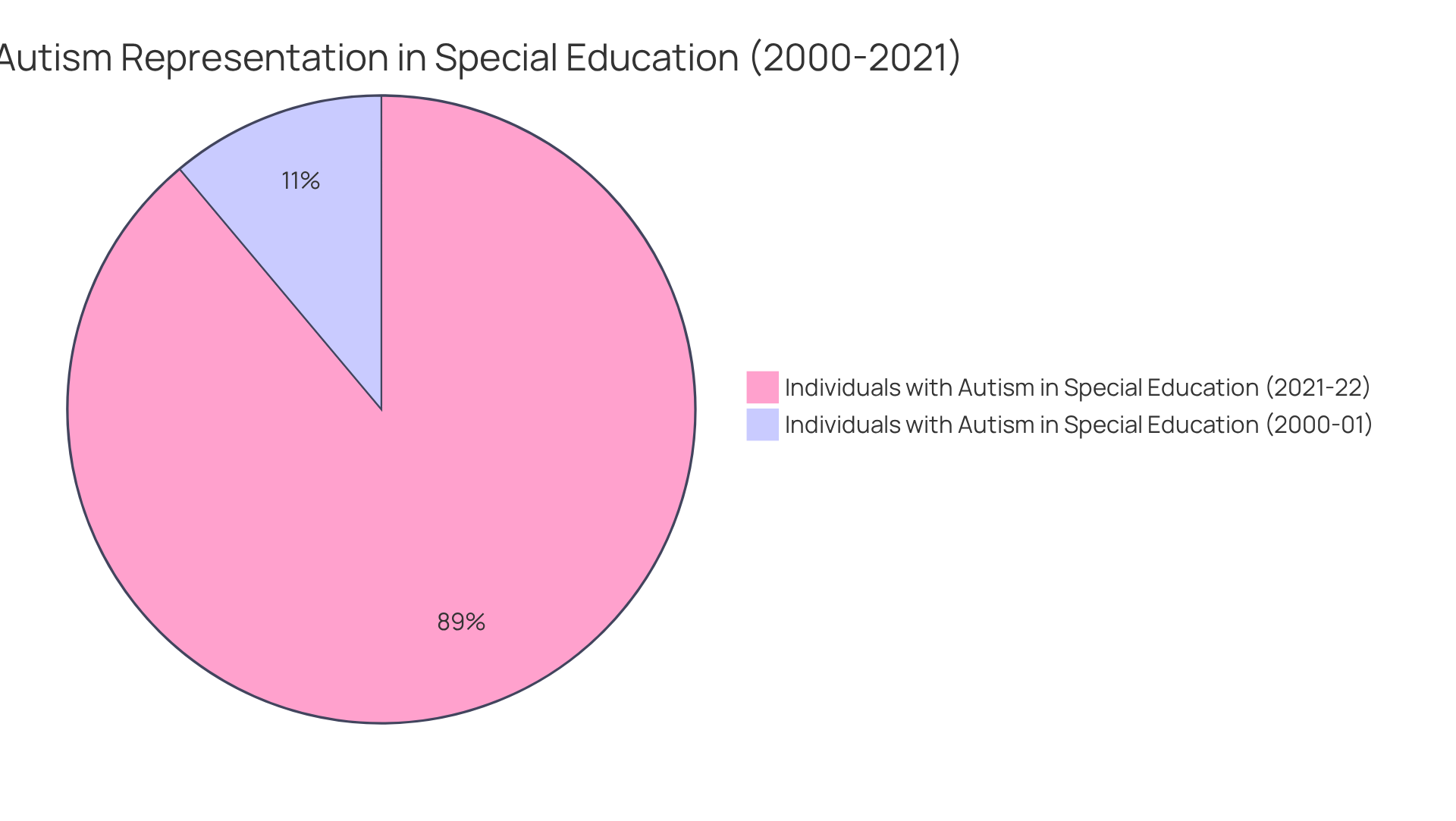
Incredible Years: Teaching Strategies for Inclusive Classrooms
The Incredible Years program is designed to empower educators with effective strategies for supporting children with special needs, particularly through autism education programs in inclusive classrooms. At the heart of this program lies a deep commitment to social-emotional learning, nurturing essential skills like self-regulation, empathy, and interpersonal communication.
By incorporating positive behavior reinforcement methods, educators can create a warm and supportive atmosphere that encourages participation and learning for everyone, including individuals on the spectrum. Furthermore, collaborative problem-solving strategies enhance classroom dynamics, allowing educators to address individual needs while fostering a sense of community among students.
Research shows that autism education programs, such as Incredible Years, significantly improve social competencies and reduce behavioral challenges, making them invaluable resources for educators striving to cultivate inclusive and supportive learning environments. Together, we can create spaces where every child thrives.
May Institute: Innovative Approaches to Autism Education
The May Institute is distinguished for its innovative methods in autism education programs, utilizing evidence-based practices to enhance learning outcomes for children with developmental disorders. Their programs focus on personalized teaching, behavioral strategies, and family engagement, ensuring that each child's unique needs are met with compassion and care.
By integrating technology with research-based approaches, the May Institute aims to provide comprehensive support for youth with developmental disorders and their families through autism education programs. The recent opening of a new campus in Chicopee, Massachusetts, as an extension of the May Center School in West Springfield, highlights their dedication to expanding services in response to growing community needs.
With a 1:1 staff-to-student ratio, the May Institute guarantees personalized attention that nurtures skill development in essential areas such as communication, language, academics, social skills, self-care, and vocational skills. As one in 36 children in the U.S. is diagnosed with a developmental disorder, the urgency of autism education programs offered by the May Institute has never been more critical.
Additionally, the release of 'Profound Autism: A Parent’s Guide' provides invaluable assistance for families navigating the complexities of autism. This guide serves as a vital resource, offering insights and support to help parents feel more empowered and informed. We encourage families to explore these resources and connect with the May Institute to learn more about the support available.
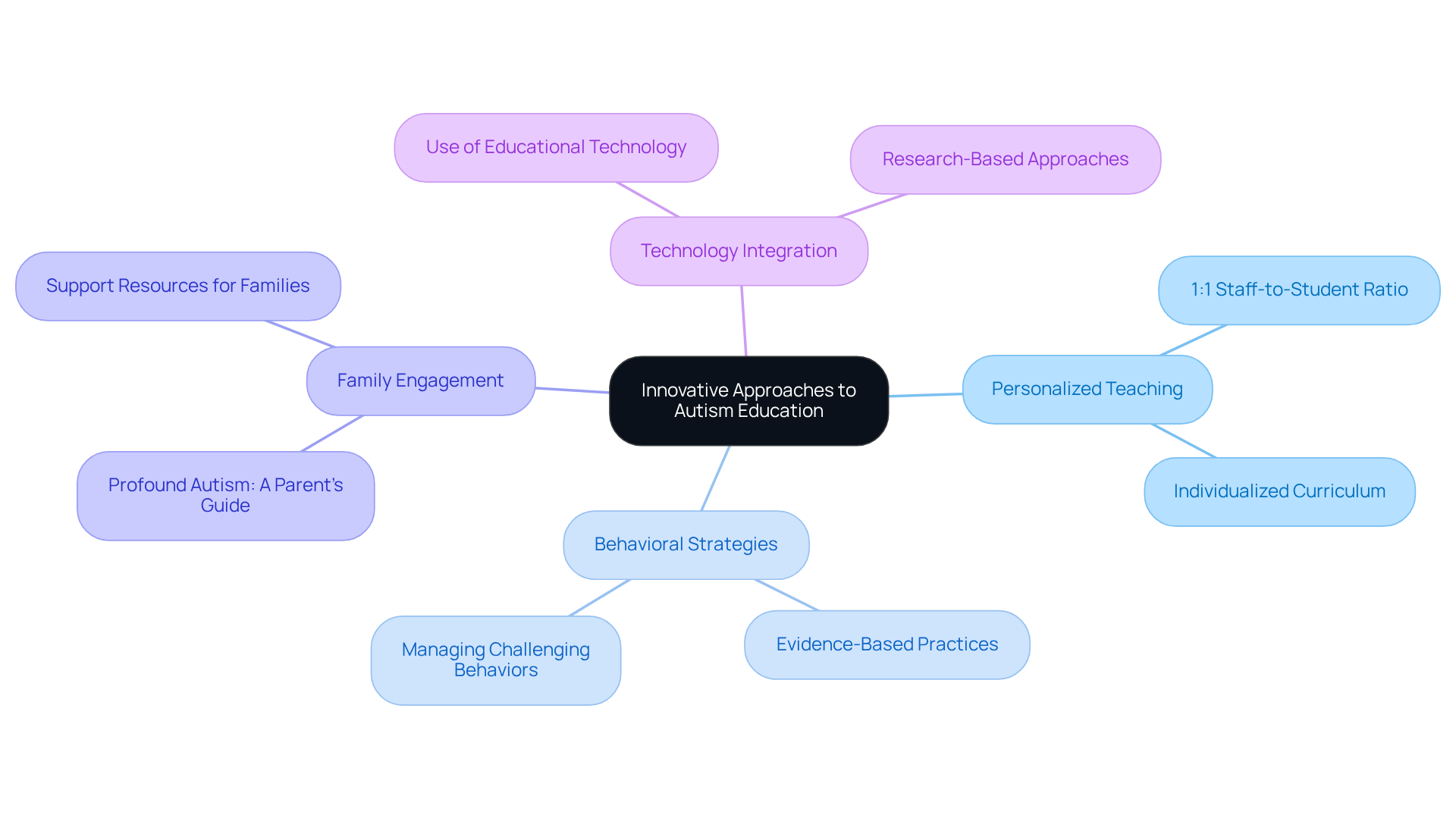
National Academies: Research-Based Strategies for Autism Education
The National Academies provide a wealth of research-based strategies aimed at enhancing autism education programs for individuals on the spectrum. Their findings highlight the vital importance of tailored interventions, ongoing assessments, and collaboration among educators, parents, and specialists. By championing evidence-based practices, the National Academies ensure that autism education programs are not only effective but also attuned to the unique needs of children with developmental disorders.
Recent studies reveal that when educators and parents unite in their efforts, the success rates of these personalized interventions soar, leading to improved outcomes for students. As we approach 2025, the emphasis on individualized strategies in autism education programs for individuals on the spectrum remains essential, reflecting the growing recognition of the diverse needs within this community. Together, we can foster a supportive environment that truly makes a difference.
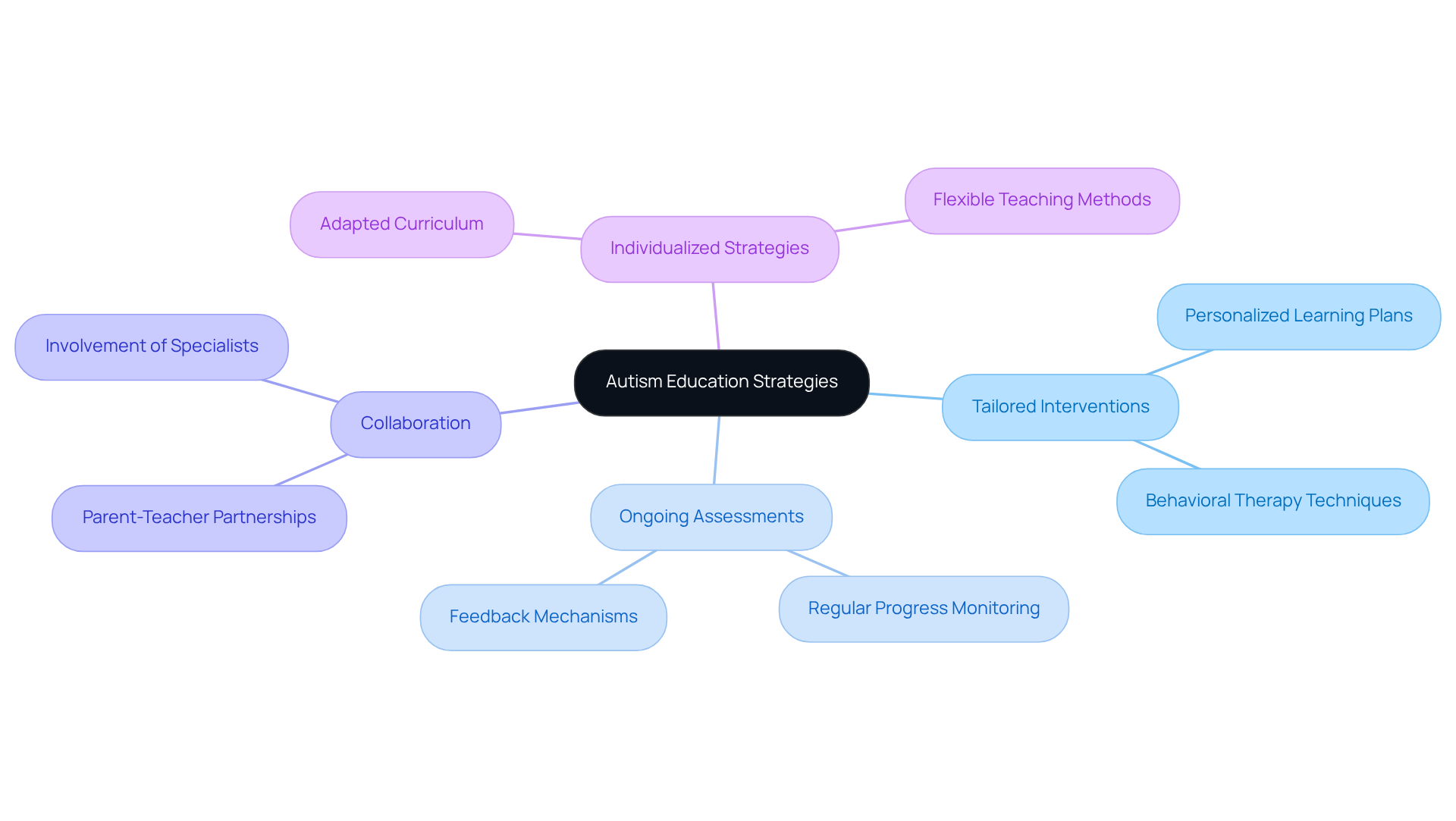
Educational Interventions: A 40-Year Perspective on Autism
Over the past forty years, autism education programs for children on the spectrum have undergone a remarkable transformation. Initially centered on behavioral modification techniques, today’s practices embrace a holistic understanding of autism, prioritizing social, emotional, and academic growth. This shift highlights a growing recognition of the diverse needs of autistic learners and the vital importance of autism education programs that celebrate their unique strengths.
Experts emphasize that early recognition of autism, coupled with appropriate supports, can lead to outcomes that are 63% more favorable than traditional methods. Moreover, communities that actively foster acceptance initiatives for individuals on the spectrum report 73% higher employment rates for autistic adults. This underscores the long-term benefits of these progressive educational strategies.
As we look ahead, the integration of holistic approaches in autism education programs continues to shape effective interventions. It is essential to ensure that every child has the opportunity to thrive in an environment that nurtures their potential. Together, let us advocate for these inclusive practices and support the journey of every child on the spectrum.
Porchlight Education: Community Resources for Autism Support
At Porchlight Education, we understand the unique challenges that families impacted by developmental disorders face. Our community resources are designed to provide essential support and connection. Through our workshops, assistance groups, and online resources, parents can share their experiences and find solace in knowing they are not alone.
Nurturing a sense of community is at the heart of what we do. We believe that by connecting families, we can help them overcome the hurdles associated with developmental disorders. Our programs not only offer valuable information but also foster relationships that empower parents to seek the support they truly need.
We invite you to explore the resources we offer and join us in creating a compassionate community where families can thrive together. Your journey matters, and we are here to walk alongside you every step of the way.
Area Education Agency: Autism Resource Teams in Iowa
In Iowa, Area Education Agencies (AEAs) are vital allies for families and individuals facing developmental disorders. These specialized resource teams provide essential training, consultation, and direct assistance to educators and families through autism education programs, ensuring that children receive the tailored interventions and services they need. By working closely with educational institutions and communities, AEAs foster inclusive learning environments that not only support individuals with developmental challenges but also enhance the overall educational experience for everyone involved.
Recent statistics highlight the success of AEAs in implementing training models that significantly improve educational outcomes. This demonstrates the effectiveness of autism education programs in providing educational assistance for individuals with developmental disorders. As we look toward 2025, the role of AEAs continues to evolve, adapting to the growing needs of learners and families. This evolution reflects their unwavering commitment to offering comprehensive support for individuals with developmental disorders within Iowa's educational institutions. Together, we can ensure that every child receives the understanding and resources necessary for their success.
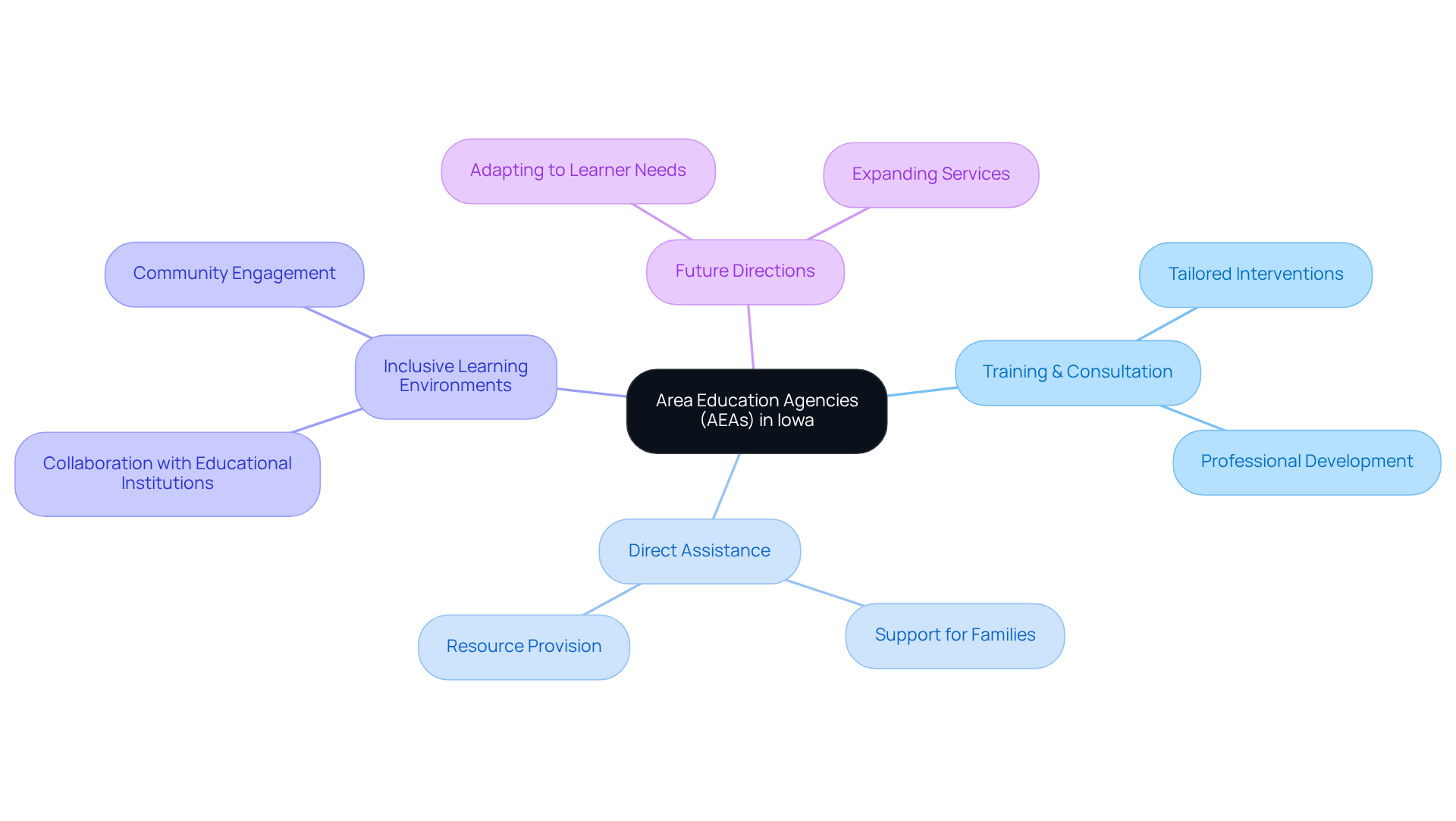
Ongoing Training: Essential for Educators in Autism Programs
Continuous training for educators in autism education programs is essential for maintaining high educational standards and providing effective support. Professional development opportunities, such as workshops and online courses, empower teachers with the latest strategies and research insights. By committing to ongoing education, educators can enhance their abilities and better meet the diverse needs of individuals through autism education programs. This investment in professional growth not only improves teaching effectiveness but also significantly enhances educational outcomes for children on the spectrum.
As Dr. Temple Grandin wisely states, 'I am different, not less,' highlighting the importance of recognizing and nurturing the unique talents of every learner. Furthermore, studies indicate that classrooms participating in autism education programs with well-trained educators report 57% better outcomes for autistic individuals, underscoring the direct impact of professional development on success. In addition, Kerry Magro reminds us, 'Autism can't define me. I define autism,' reinforcing the necessity of fostering an environment of acceptance and understanding to empower students with autism. Together, we can create a supportive community that uplifts and nurtures every child.
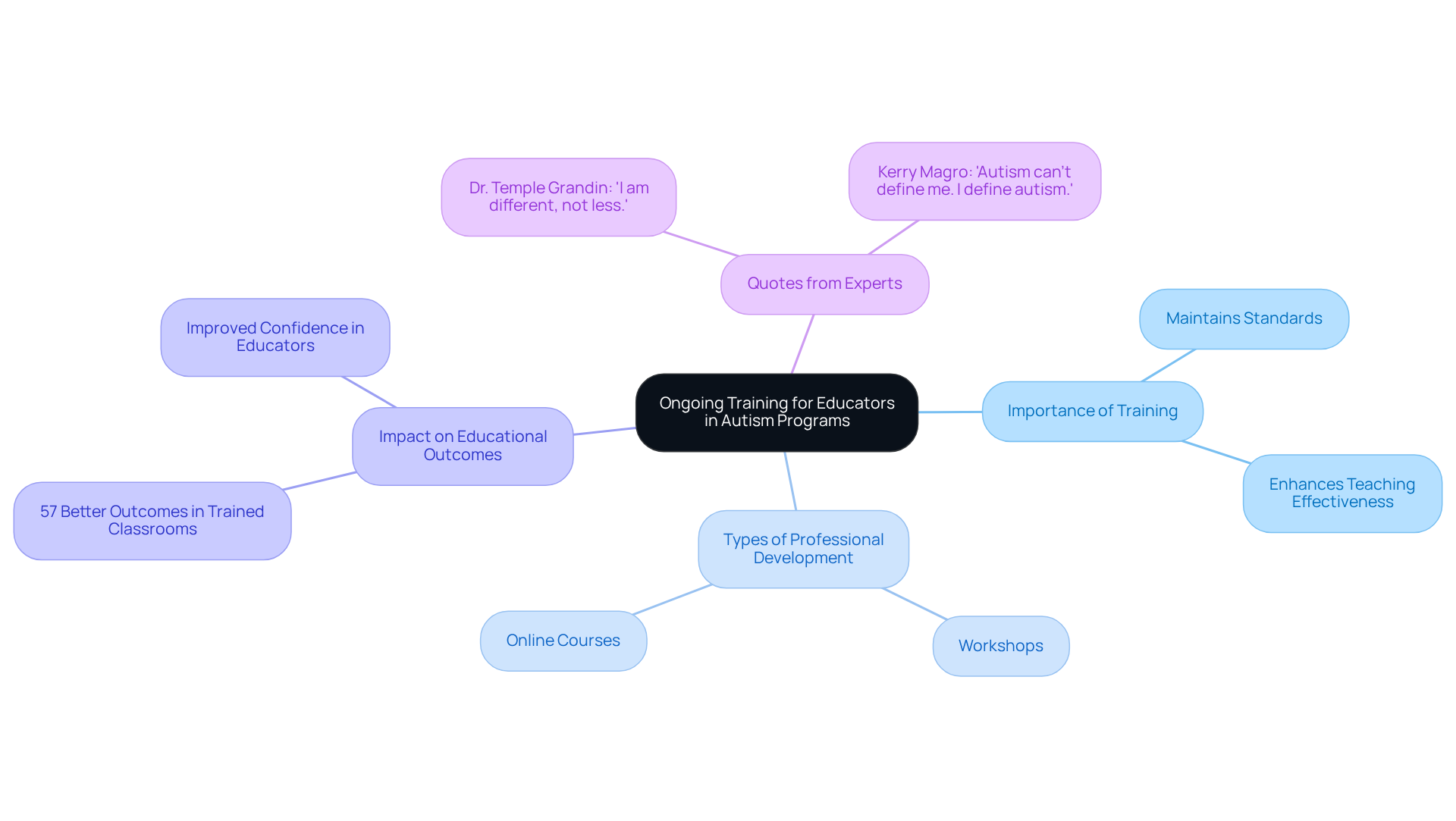
Conclusion
The landscape of autism education is evolving, and it’s heartening to see a growing emphasis on personalized support and community engagement. This article highlights ten essential programs and resources that are thoughtfully designed to empower parents and educators as they navigate the complexities of autism education. By focusing on early intervention, tailored strategies, and the importance of collaboration, these initiatives aim to unlock the potential of every child on the spectrum.
Key insights from the discussion reveal the transformative impact of community support. Families involved in these programs have experienced significant improvements in educational outcomes and overall well-being. The commitment of organizations such as ASD Media, the Iowa Department of Education, and the May Institute showcases a comprehensive approach to autism education that prioritizes individual needs while fostering inclusive environments. Additionally, ongoing training for educators is crucial in enhancing the effectiveness of these programs, ensuring they remain responsive to the diverse challenges faced by students with autism.
As we journey towards 2025, it is vital for parents and educators to actively seek out and engage with these invaluable resources. By fostering a supportive community and advocating for inclusive practices, every child can truly thrive in an environment that recognizes their unique strengths and abilities. Embracing these essential autism education programs not only benefits individuals on the spectrum but also enriches the broader community, paving the way for a more inclusive future. Let’s come together to support one another and ensure that every child has the opportunity to shine.
Frequently Asked Questions
What is ASD Media and what resources do they provide?
ASD Media is dedicated to enhancing ABA therapy application and developing autism education programs. They offer a range of resources, including newsletters, articles, and community forums, to help parents and professionals support individuals with developmental disorders.
Why are early interventions important in autism education?
Research indicates that early interventions are crucial for unlocking potential and improving long-term outcomes. Early acceptance of a neurodevelopmental diagnosis correlates with a 63% improvement in results.
How does community support impact families with children who have developmental differences?
Community support significantly transforms perspectives; 83% of parents report that having a child with developmental differences has expanded their viewpoint. Additionally, community forums can boost caregiver well-being by 67%.
What is the Iowa Department of Education's approach to autism education?
The Iowa Department of Education has established various autism education programs tailored to meet the unique needs of students with Autism Spectrum Disorder (ASD), including specialized classrooms and individualized education plans (IEPs).
What recent advancements have been made in Iowa's autism education programs?
The Autism Support Program, initiated in 2013 through Iowa Senate legislation, has improved access to Applied Behavior Analysis (ABA) services, leading to significant improvements for students enrolled in full-time autism education programs within 12 to 18 months.
What rights do youth with developmental disorders have under federal law in Iowa?
Under the Individuals with Disabilities Education Act (IDEA), youth with developmental disorders are entitled to autism education programs and a Free Appropriate Public Education (FAPE).
What does the Half Hollow Hills (HHH) School District offer for students with autism?
The HHH School District provides a specialized autism program that includes individualized instruction, behavioral support, and social skills training, aimed at creating an inclusive learning environment.
How has the percentage of individuals with autism in special education changed over time?
The percentage of individuals with autism in special education has risen from 1.5% in the 2000-01 school year to 12% in 2021-22, highlighting the growing demand for specialized programs.
What role does parental involvement play in autism education programs?
Parental involvement is crucial for the success of autism education programs. Consistent communication with educators fosters a collaborative approach, ensuring that children receive the necessary support.




